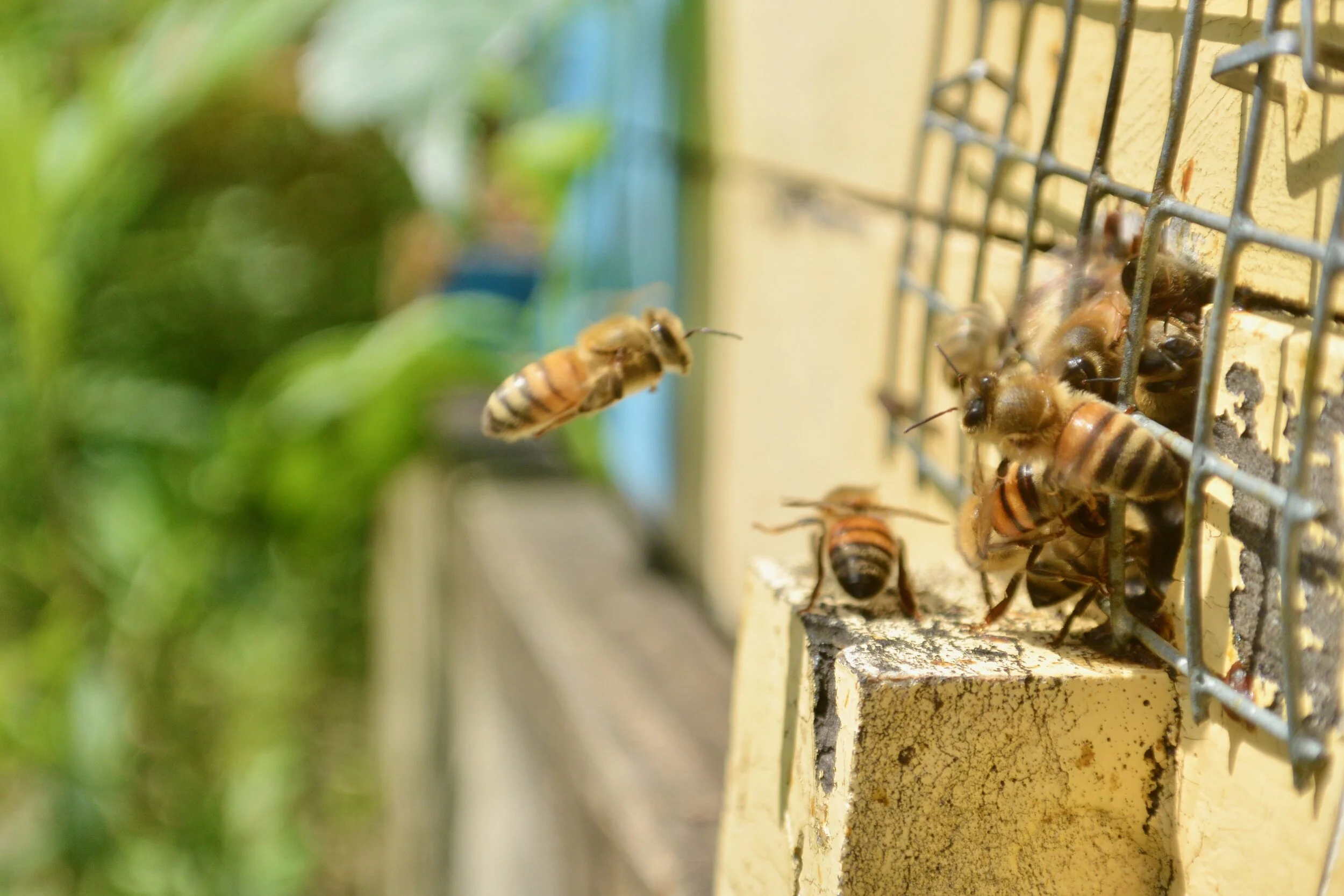PUBLISHED ON August 23, 2020 from The Register Citizen by Robert Miller
There are islands of purple Joe Pye weed blossoming in the meadows at Randall’s Farm in Easton.
Bees return to a hive at Randall’s Farm in Easton.
There’s chicory and Queen Anne’s lace. Along the edges, there’s clover and lamb’s foot trefoil flowering in the resurgent grass where mowers have swept through.
“This place is honeybee heaven,” David Blocher of Redding said of the 34-acre preserve owned by the Aspetuck Land Trust.
Blocher, 57, has been keeping bees for most of his life — he started in Wisconsin when he was 12 years old. He now tends about 120 hives in 13 different sites in Fairfield and Litchfield counties and is past president of the Backyard Beekeepers Association.
Blocher is using the 15 colonies he has on Randall’s Farm to teach newbies to keep bees. But he’s also raising queen bees with a natural resistance to honeybees’ great enemy — the tiny varroa mite, whose Latin name is Varroa destructor.
“They’re worse than bears,” said Mike Rice, who owns Mike’s Beehives in Roxbury. “They’re worse than pesticides.”
Blocher wants to spread these queens to other area beekeepers. When the queens lay eggs, some of that resistance may be passed on to the next generation of bees and the next after that.
If it works, it could save beekeepers time and money now spent ridding their hives of mites. It could prevent colonies from weakening, and get more pollinators out across the landscape.
Lou Bacchiocchi, the Aspetuck Land Trust’s land stewardship director, said the land trust was enthusiastic about the project.
“It’s good to have pollinators there,” he said. “But it’s important for us to support scientific research.”
George Luft, Wayne Zabel, Julia Jaynes and David Blocher, left to right, check a honeybee hive at Randall’s Farm in Easton owned by the Aspetuck Land Trust. Blocher is cultivating queen bees that are resistant to mites that can severely damage hives.
People have been keeping honeybees and harvesting honey for millennia — there are records of the ancient Egyptians keeping bees dating back to 2500 BCE. (The Chinese may have started earlier.)
All the bees beekeepers now keep are European bees — Apis mellifera — crossbred from different European lines.
European colonists to the New World brought them to Virginia in 1622. Gradually, but greatly, honeybees altered our landscape, changing the North American ecology with their pollinating ways.
This year, many homebound humans busy social distancing because of coronavirus have felt the lure of buzz and honey.
“It’s the homesteading mentality that kicks in in times like these,” said Leslie Huston, who owns Bee Commerce, a beekeeping supply shop in Newtown. “People are gardening. They’re baking. They’re keeping bees.”
But in the latter half of the 20th century, the verroa mite began spreading from Asia to Europe, then North America, where it showed up in 1987.
Honeybees at Randall’s Farm in Easton.
These tiny, parasitic mites breed only inside bee colonies. They feed on both bee larvae and the adults, nestling into the sections of the adult’s abdomen and feeding on honeybee fat cells.
The mites weaken the honeybees’ immune systems and spread viral diseases, including deformed wing virus, which leaves bees with shortened useless wings.
Beekeepers can use a variety of methods to control mite infestations, using either synthetic or organic compounds to kill the mites, and installing traps and screening on the bottom boards of the hive.
Blocher hopes to address the problem more directly.
The varroa sensitive hygiene bees he’s raising are fastidious groomers who lick off any mites they find. They can also catch the scent of the mites in pupal cells — the stage where larval bees begin to develop into adults.
“They uncap the cells, pull those pupae out, and remove them,” Blocher said.
He’ll continue breeding varrora sensitive hygiene queens this year, he said. By next spring he hopes to start circulating them to other beekeepers. The initial work he’s done with them is promising.
A honeybee smoker calms bees at Randall’s Farm in Easton.
“It’s really encouraging to see,” Blocher said of the hives that are largely mite-free.
Which, if you fancy highly social, honey-producing, gentle insects who sting only when provoked, would be a blessing.
Brenda Renfroe of Danbury has been keeping bees for four years and now has 13 hives.
“It’s always different,” she said of the time she spends tending to her hives. “You have to be calm, so it really slows you down. I have to block out everything else. And I like that.”
“You’re out there with tens of thousands of these tiny creatures,” said Rice of Roxbury, “and you can see all the work they do, what social creatures they are.”
“They are a delight,” said Huston of Newtown. “There are sights and sounds and smells to beekeeping. You see flowers differently. You see the world differently.”
Andy Hatt, Julia Jaynes, Art Dopman and David Blocher, left to right, check out honeybee hives at Randall’s Farm in Easton.


